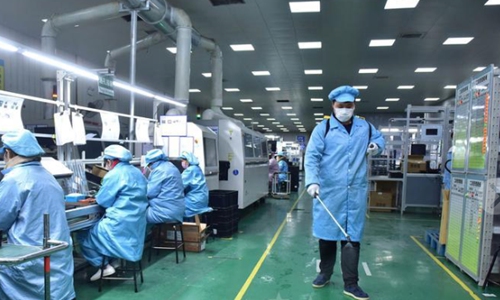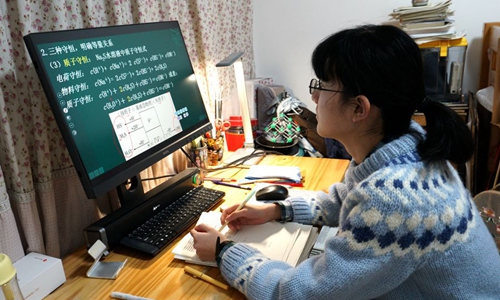SOURCE / INDUSTRIES
Closed Chinese firms face lengthy approval procedures
Local governments are citing issues from unqualified thermometers to lacking signature numbers

A worker sprays disinfectant at an auto parts factory in Shijiazhuang, North China's Hebei Province, on Monday. Photo: CNSphoto
It has been a week since February 10, the date most Chinese companies had previously set to resume production amid the coronavirus outbreak, yet most small and medium-sized manufacturers across China still find themselves trapped in lengthy and complicated government approval procedures.
In the manufacturing hubs of East China's Jiangsu Province and South China's Guangdong Province, the Global Times learned that local governments had rejected enterprises' applications citing issues as varied as unqualified thermometers to a lack of signatures from employees.
Some industry insiders told the Global Times that their local government's approval rate is "extremely low," with some at around 10 percent. In Shenzhen's Yuehai Street Office, reportedly home to 40,000 companies including high-tech firms such as DJI and Tencent, only 100 companies can be allowed to reopen each day.
Duan Lianmin, the manager of a Shenzhen-based glass factory, is still preparing paperwork and protective supplies to apply for a second on-the-spot examination from local authorities.
She was informed of the requirements to restart production by her local industrial park's management board on February 6. To get started, she needs to fill in six documents including a letter of commitment. Detailed information on every worker must also be provided, including their recent activities and the places they have stayed in recent days.
Additionally, protective equipment and facilities such as isolation rooms, thermometers, masks and disinfectant sufficient for at least seven days must also be prepared. Duan has spent more than 10,000 yuan ($1,433) on necessary purchases and submitted an application as soon as she received the items on February 11.
Local regulators inspected her factory on Friday but did approve it to reopen, citing problems with thermometers. "They stressed they must be infrared thermometers, and said the ones I had provided were not the right type," Duan recalled.
She has since been scrambling to find infrared thermometers. Duan placed an order online over the weekend, but as China's courier services have not yet returned to normal, she is anxious to know when she can receive her factory's "lifelines."
"I don't want my efforts to be in vain, but I don't think I could pass a second inspection anyway. I need to line up for another five days and wait for local officials to visit, and then they could reject me with other excuses," Duan said.
According to Duan, many managers of small businesses have given up their applications as chances of passing are very slim. "We really hope local officials can take some responsibility rather than passing the ball to us," Duan signed.
Complicated procedures
Jack Wang owns an auto parts factory in Nantong, East China's Jiangsu Province, that supplies parts for a German carmaker. He seems to have had more luck than Duan.
Wang's request was approved by the local authorities. He plans to restart production this week, but can only run at "partial capacity" due to labor shortages, as some of his workers from other cities are under quarantine or unable to return due to sweeping measures to prevent the new epidemic from spreading further. Local workers account for less than half of the factory's total workforce.
Recalling the whole process, Wang joked that it was a "physical and mental test" for all entrepreneurs.
"I first submitted my documents to the local industrial park's management committee. But the committee said some of the materials should be submitted to the tax bureau, while others should be directed to the village committee. So I had to run through different government departments," Wang said.
The local authorities also require companies to provide hotel rooms to quarantine returning workers for 14 days. Wang complained that the measure has dialed up the pressure on his capital, which is already strained as labor costs and factory rental fees are mushrooming yet no source of income has been generated.
Duan also said her company's capital chain could only sustain itself for one more month, until the end of March.
"I'm also worried about losing overseas clients - those from the US and Europe - if we do not begin shipping our products immediately. Some manufacturers in Vietnam and other Southeast Asian countries may replace our orders," Duan said.
Life-or-death moment
Calls for a balance between normal economic activities and epidemic prevention measures are mounting on China's social media platforms.
"This is a life-or-death moment not only for millions of small and medium-sized enterprises (SMEs) but also for China's manufacturing industry as a whole," a manager of a Dongguan-based original electronics equipment manufacturer, who spoke on condition of anonymity, told the Global Times on Monday.
He said that if the coronavirus is not contained in March, factories may be forced to relocate. What's worse, China may have to relinquish its leading role in supplying electronics parts to other emerging economies. The country currently produces 70 percent of all smartphones sold globally, according to an IHS Markit report.
"In the long run, it could also endanger China's global position as the world's factory," the manager pointed out.
Duan urged Chinese officials to roll out more large-scale supportive measures rather than setting up barriers for the resumption of production and adopting a one-size-fits-all approach for SMEs.
On Sunday, local government in Yiwu, East China's Zhejiang Province, announced a batch of policies to subsidize workers so as to ameliorate persisting labor shortages. Yiwu is known as the world's largest small commodities market.
Authorities in East China's Jiangxi Province announced they will cancel government approval procedures for all kinds of enterprises and construction projects. Companies will only need report to local regulators once they have resumed production. Returning workers will no longer be required to present a clean bill of health.
"We hope such measures will come at a breakneck speed," Duan said.


